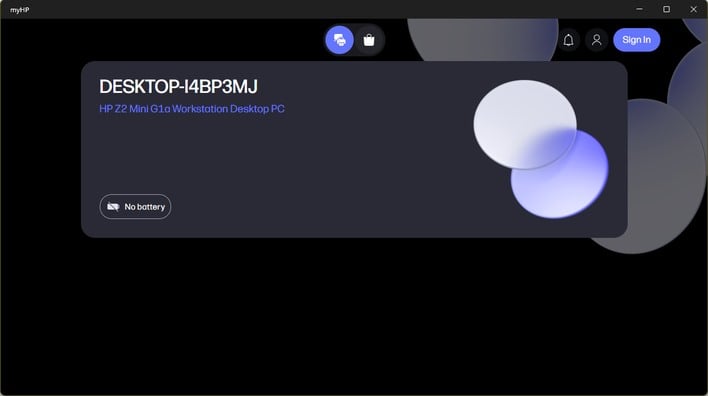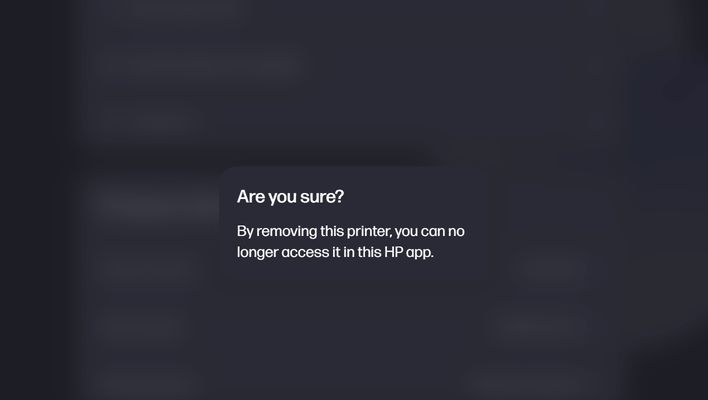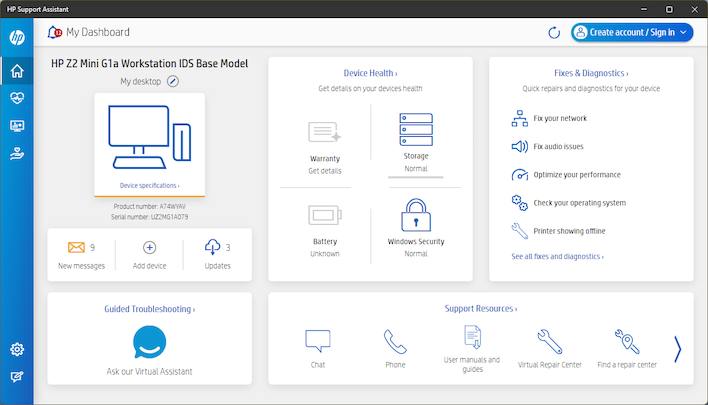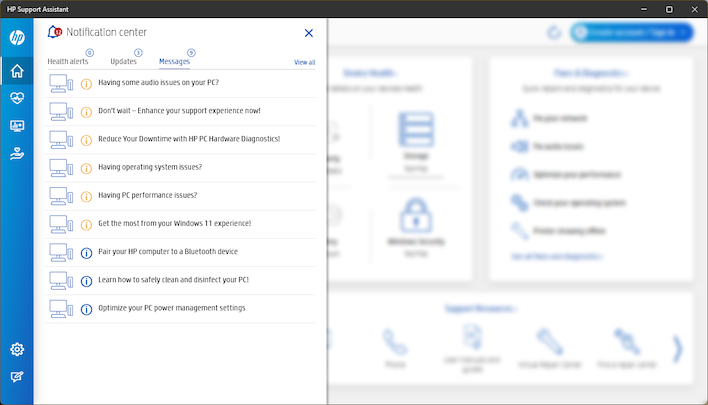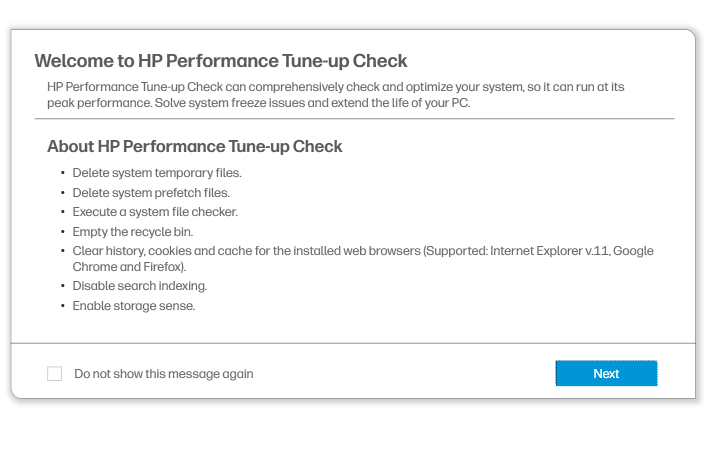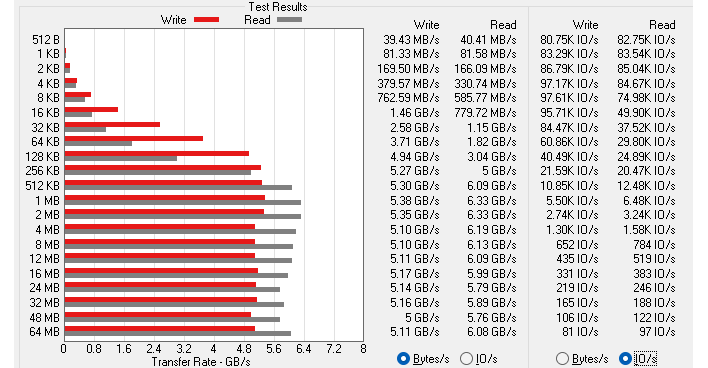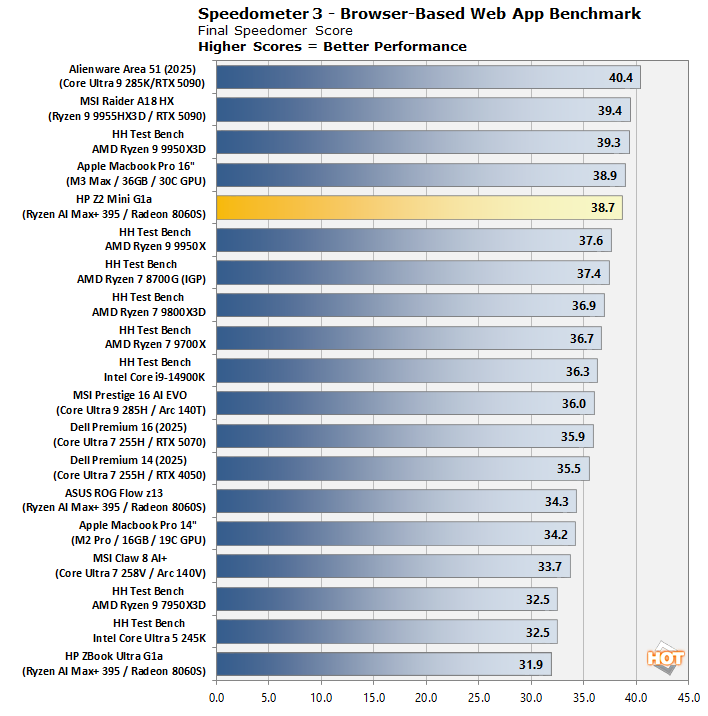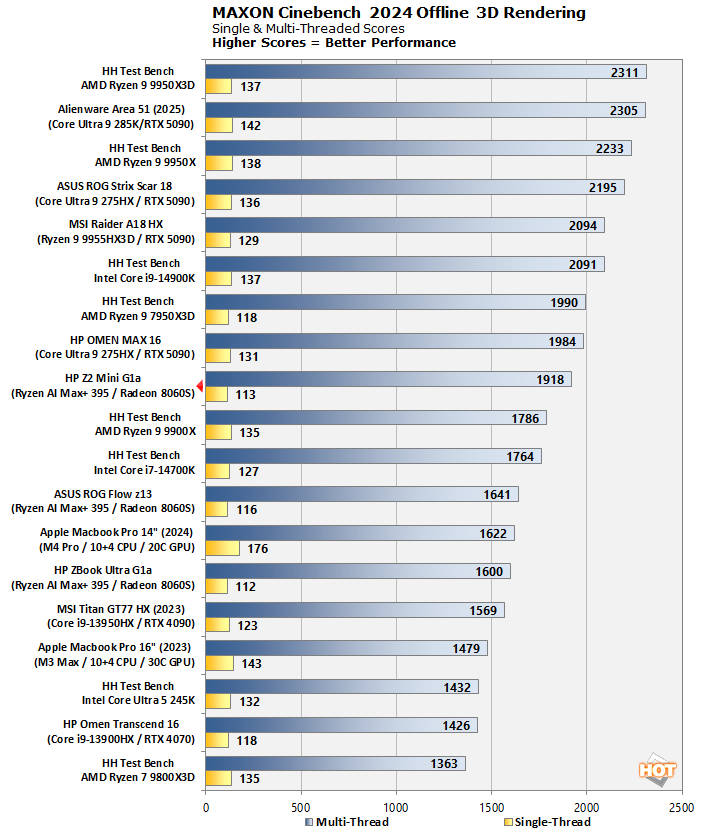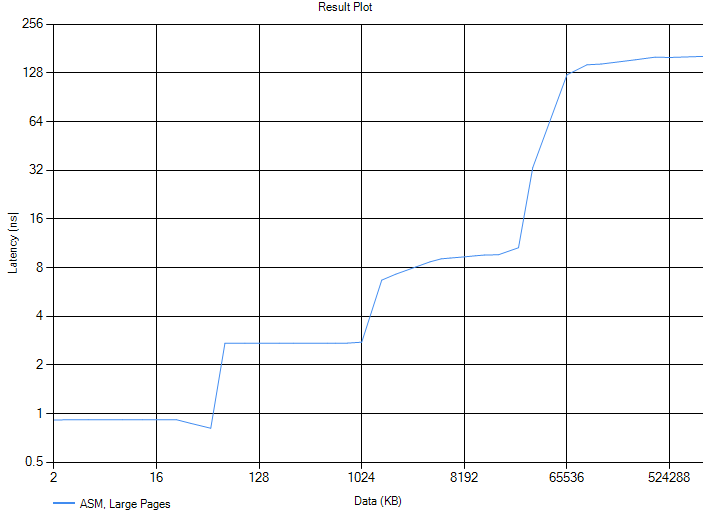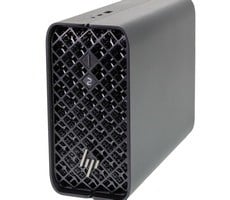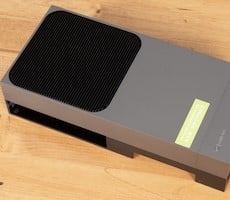HP Z2 Mini G1a Workstation Review: Petite Power For Professionals
We're not going to go over MyHP in detail again because we've already done that for another machine recently (the Omen Max 16 gaming laptop). The app is fundamentally identical between the two machines, and all of our criticisms of the MyHP application from that review apply here.
Except there's even less available with the Z2 Mini, because the few functions that MyHP could manage on the Omen Max laptop, such as 3D sound and display brightness, don't exist on the Z2 Mini. The app quizzically tells you that there is no battery installed, and clicking on a "Learn more" link gave us the popup above, with no way to move on or dismiss it other than closing the program—which we had to 'end task' to accomplish. HP definitely has some work to do to fix this app, but it can probably be removed altogether.
The familiar HP Support Assistant is here, too. It seems strange to have a consumer-focused app like this preinstalled on a professional machine, but the Z2 Mini somewhat straddles that line, so we suppose it has a place here. HP Support Assistant is primarily meant to help HP's personal computing customers manage system updates and troubleshoot issues, and it has myriad functions for that purpose, including various automated diagnostics as well as tools to help you get warranty service.
The app also presented 12 notifications and every one of them was an advertisement for an HP product. Some of them take you to troubleshooters, while others attempt to offer you tutorials and add-on service contracts. This would normally be a minor complaint, but if you have pending notifications, the HP Support Assistant puts a yellow blob in your taskbar that is hard to ignore:

We decided to see what HP would offer if we told the app that we were experiencing PC performance issues and were taken to a separate app called "HP Performance Tune-Up Check" that promises to do things like empty the recycle bin and delete system temporary files.
It's possible that some of these tasks could help with performance, but this seems more like a tool meant to give some peace of mind to users who aren't particularly tech savvy. In particular, deleting system prefetch files and disabling search indexing could potentially make the system's performance worse in some circumstances. Then again, the system file checker could potentially fix corrupt files in the Windows installation, which can cause all sorts of issues.
Overall, there's really not much in the HP software suite that users will absolutely need, aside from easy access to updates and potentially Wolf Security, given that it adds a bit to the bottom line when you purchase the machine. We would have liked to have seen a few functions that simply aren't here, however, like manual fan speed controls or TDP controls.
With that out of the way, let's look at some data.
HP Z2 Mini G1a System And Productivity Benchmarks
The meat and potatoes of any HotHardware review are the benchmarks. Before running our selection of benchmarks, we apply the latest Windows and driver updates to the system we are testing. In this case, we actually ran our benchmarks before and after applying the updates recommended in HP Support Assistant, one of which was actually a BIOS Rollback. It didn't seem to make any difference, though.ATTO Disk Benchmark
As is tradition, we'll start off the barrage of benchmarks with ATTO. The ATTO disk benchmark is a fairly quick and simple test which measures read/write bandwidth and IOPS across a range of different data sizes. While we don't typically compare these results across multiple machines, it's useful to gauge whether a particular machine's storage subsystem is up to snuff.The Kioxia XG8 SSD that HP brands as "HP Z Turbo" storage for this machine is plenty fast enough to serve for just about any use case. We see reads peak over 6 GB/second and writes peak at just under 5.4 GB/second, both of which are acceptable for a Gen 4 drive, although certainly not world-beating. Peak IOPS come in around 97,000 at the 4K transfer size, meaning that random accesses are sufficiently speedy. No real complaints here, but the XG8 is a fairly mainstream option and we saw higher performance in our initial review of this SSD, which may mean that the drive is slightly underperforming in HP's machine.
Speedometer 3 Browser Benchmark
We use BrowserBench.org's Speedometer test to take a holistic look at web application performance. This test automatically loads and runs a variety of sample web apps using the most popular web development frameworks around, including React, Angular, Ember.js, and even plain-Jane JavaScript. All tests were performed using the latest version of Chrome.You're going to notice a broad mix of performance results in this review, and that's because this system is a desktop machine that uses laptop hardware. As a result, we've mixed in some desktop results, including DIY test bench results, as well as comparisons against laptops.
In Speedometer, we see the Z2 Mini G1a landing in the upper echelons of machines we've tested, actually slightly outperforming the Ryzen 9 9950X. However, this test is surprisingly sensitive to whether you're using integrated or discrete graphics—with the advantage going to integrated graphics, not discrete—and most of our test bench results are using discrete GPUs, so keep that in mind.
MAXON Cinebench 2024 3D Rendering Benchmark
Next up is the latest-generation 3D rendering benchmark from Maxon, based on the Cinema 4D rendering engine. It's a purely CPU-based test that doesn't make use of the graphics processor at all, and it scales very well with additional CPU cores. We ran both single- and multi-threaded tests on all of the machines in the charts.In Cinebench, we see a more middling result. This result is considerably behind the Ryzen 9 9950X that has two of the very same AMD Zen 5 CCDs. That part is clocked considerably higher thanks to its nature as a native desktop CPU, though; it's able to hit around 5.1 GHz on all 16 cores under load, while the Ryzen AI PRO Max+ 395 in our system settles in around 4.3 GHz on all 16 of its cores. The difference is plain to see, although the performance is very far from "bad", especially considering the HP machine's modest power consumption, as you'll see in a just a bit.
Blender 3D Rendering Benchmark
Blender is a free and open source 3D creation suite that can handle everything from modeling, rigging, and animation to simulation, rendering, compositing and motion tracking. It has a purpose-built benchmarking tool that will track the time it takes to complete rendering a particular model (or models). We used the CPU-focused benchmark with the three standard models: monster, junkshop, and classroom, each of which represents a different level of detail (and thus load on the renderer.)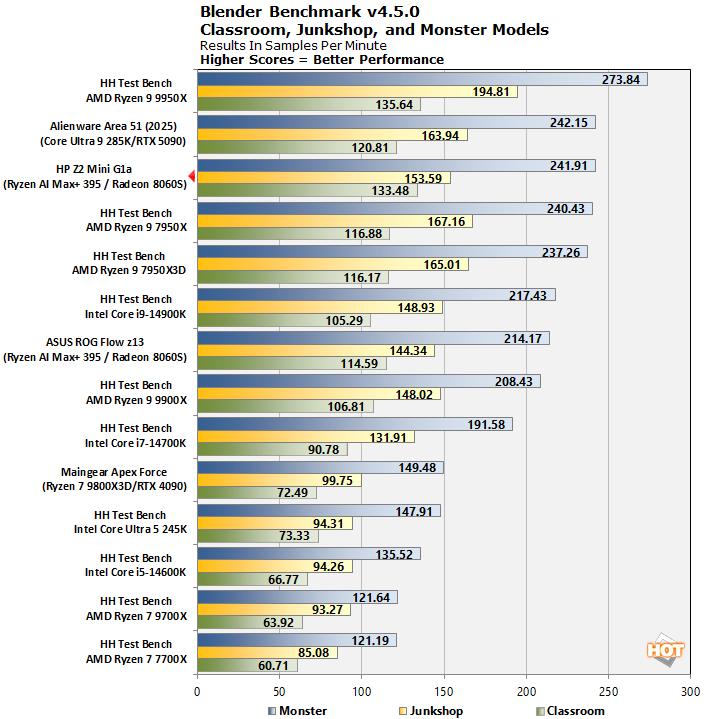
We don't normally test Blender on laptops, so this chart is entirely desktops. We thought that the 256-bit memory bus on the Ryzen AI Max+ PRO 395 might give it an advantage here, but as you can see, it only really seems to matter in the extremely detailed Classroom test. For both Blender and Cinebench, thermals are a concern as well as power, but the real "issue" is simply that it just doesn't clock as high as proper desktop CPUs. We put "issue" in quotes because it's still the third-fastest desktop we've ever tested in this benchmark. If you still prefer CPU rendering in Blender, you could do a lot worse than the Z2 Mini.
Geekbench 6 CPU Performance Benchmark
Geekbench is a cross-platform benchmark that simulates real-world workloads in a wide variety of tasks, including encryption, image processing, physical simulation, machine learning, and many more. We tested the systems featured here with the latest Geekbench 6 version to get an idea of their overall system performance.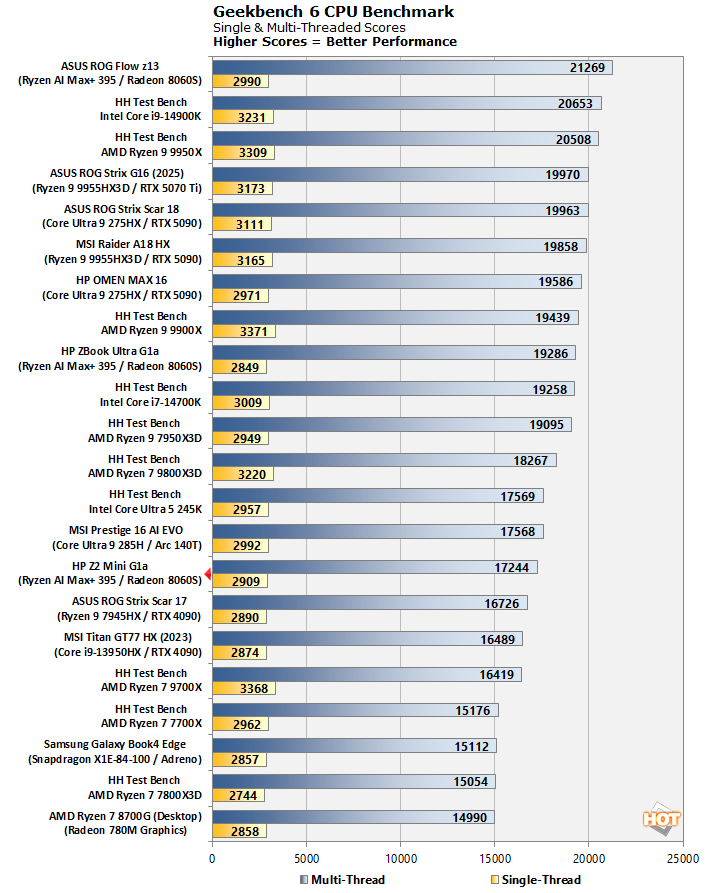
We're going to pull back the curtain a little here. This review was supposed to be done a while back, but this Geekbench 6 result sent us on a quest to attempt to figure out why this system performs worse than the Zbook Ultra G1a and especially the ROG Flow z13 in a few benchmarks. We tested a fresh Windows install, we tested Linux, we tested various system settings, and we never really came to a satisfactory explanation, though high memory latency could be the culprit.
This performance difference is real and repeatable, though it's worth mentioning that Linux performs over 35% better in this benchmark on this system. Other benchmarks, including Blender and Browserbench, also see gains in Linux, but to a smaller degree. Whatever the case, specifically on this machine, Windows 11 fumbles in Geekbench. If you want to compare against our Linux scores, they were 3134 1T and 23849 nT, which would put this machine at the top the chart, but we're presenting the Windows results because that's what this machine came with. HP does sell it with Linux, though.
UL PCMark 10 Productivity Benchmark
The standard PCMark 10 benchmark uses a mix of real-world applications like OpenOffice and Zoom as well as simulated workloads to establish how well a given system performs productivity and content creation tasks, including (but not limited to) image and video editing, web browsing, teleconferencing, document creation, and so on. We ran it on all these machines to see which one is the best for this kind of creative work.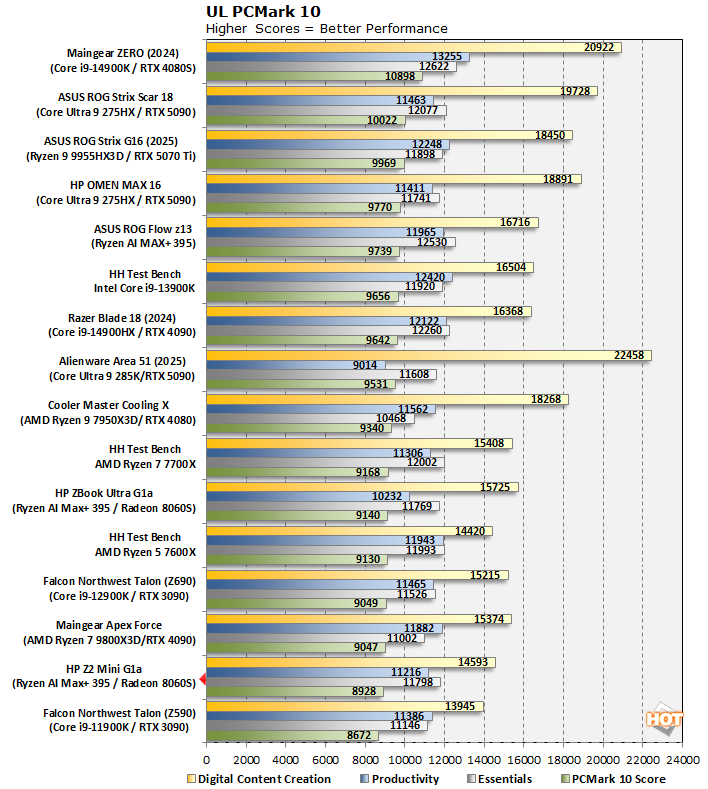
In PCMark10, we discarded a lot of results to avoid having an extravagantly long chart while still giving a reasonable context for what kind of performance you're getting. This chart is sorted by the PCMark 10 overall score, but that can make it easy to just look at the ranking and ignore the rest of the data. In an absolute sense, every single score on this board is fantastic, but even in a relative sense, the Z2 Mini does very well on the Essentials and Productivity scores. It's really the Digital Content Creation score that pulls it down, and that score is GPU-accelerated, meaning that machines with powerful discrete GPUs have much higher scores here. Nearly 9,000 points in PCMark 10 means this is a very, very fast PC for this kind of work.
UL PCMark 10 Applications Benchmark
We've started using the PCMark 10 Applications benchmark a bit more because it measures performance in Office and Edge using native instruction set-compatible versions of the apps for optimal performance across both x86 and Arm architectures. The following results should paint a picture of performance with the best foot forward from all systems tested.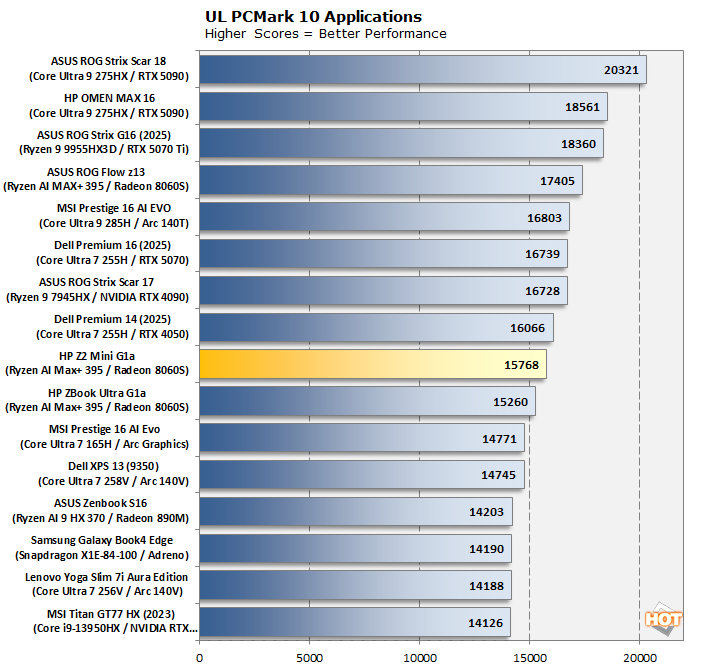
PCMark 10 Apps sort of has the same problem as the regular PCMark 10, where even the lowest score on the chart is still fantastic performance. What it's testing—application performance in Microsoft Office and Edge browser—is simply not that demanding for most modern PCs. Still, it does give us the chance to compare the Z2 Mini against the Qualcomm Snapdragon X Elite, which it handily crushes, at least in this test.
Clamchowder Memory Latency Microbenchmark
One factor we suspected in the odd performance of the HP Z2 Mini G1a (relative to the ASUS ROG Flow z13, in particular) was high memory latency. Systems that are tuned for maximum stability, as is the case with most professional gear, may suffer in terms of performance in comparison to gaming gear that is more likely to ride the ragged edge of reliability. How did HP tune the Z2 Mini G1a's memory?From a pure performance perspective, these numbers aren't great. 160ns is a high value, but once again, this is almost assuredly intentional to ensure the maximum possible system stability. As you've seen, it doesn't have a huge outlying effect on most performance benchmarks. Still, this is the highest memory latency result we have seen, which is saying something in comparison to server systems sporting multi-bit ECC.

Image: HP
Actually, on the topic of ECC, HP claims that this machine has ECC memory. We checked, double-checked, and triple-checked this, and as far as we can tell, this isn't the case. In the strictest sense, all DDR5 memory has on-chip ECC, but that's not normally what anyone thinks of when they say "ECC memory." Typically, ECC memory has a wider bus, parity bit generation in the memory controller, and OS-visible error reporting. None of that is present here, so we think HP's mention of ECC in the specs for this system could use some clarification.
If you're wondering "where are the AI benchmarks?" then head over to the next page, where we play with AI and talk about gaming a bit.

